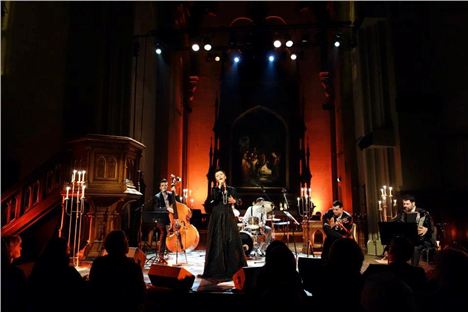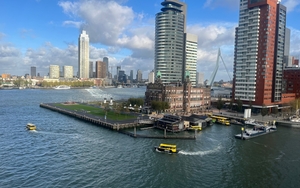MENTION Bosnia and chances are the term “ethnic cleansing” will mentally follow: that political shorthand for the country's destruction, and death at the hands of Slobodan Milosevic's forces, 20 years ago.
However, Bosnia has a very different side, with a rich musical tradition that has proved stronger than the forces of hatred and division.
A strong contingent of Bosnians resident
in the north of England, had made the
trip to see this legend of their homeland
This was movingly displayed at St George's Hall on Saturday night last, when leading Bosnian singer Amira Medunjanin gave a performance of sevdah, the melancholy, yearning, Balkan answer to the blues, mainly found in urban areas.
With a intensely delivered set of love songs, it is no surprise to learn that Medunjanin has been compared to Billie Holiday and Cesaria Evora.
The concert featured work from her latest, critically lauded album, Amulette, and she was joined by Bojan Zulfikrpasic (piano) and Nenad Vasilic (double bass).
The event came about because Simon Glinn, executive director of Liverpool Philharmonic, worked in Sarajevo during and after the war. He and befriended the singer's husband-to-be, Bekim.
They worked together in a number of musical endeavours which led, among other things, to the birth of the Sarajevo International Jazz Festival.
"Bekim worked with me on a project called Community Music Sarajevo (CoMuSa) which did many things including - later on - supporting the early development of the Jazz Festival in 1997, he told Liverpool Confidential.
He added: "It was a side project of the Jazz Festival, called Xenophonia, that brought Amira and pianist Bojan Zulfikarpasic together for the first time in 2009."
So when Glinn heard that his old friends were coming to play London's jazz festival, last week, he made it his business to see that they stopped off in his own hometown.
And Amira told the rapt audience of her pleasure at performing in “this wonderful hall”.
The repertoire was not confined to Bosnian music, sevdah also exists in Serbia, Kosovo, Montenegro and the Former Yugoslav Republic of Macedonia, so songs flew the flag for all these places, with the musicians themselves coming from a mix of Serbian and Bosnian backgrounds.
The result was haunting and compelling, and while Amira was singing in a language I suspect many in the audience did not understand, there were many who indeed did. A strong contingent of Bosnians resident in the north of England, had made the trip to see this legend of their homeland.
The liveliness of the performance and their enthusiastic response gave everyone a flavour of what it was about, particularly one about drunken sailors which was sung with great relish - and Amira's command of colloquial English demonstrated when she described the sailors being “wasted'”.
Among the attendance was the Observer journalist Ed Vulliamy, complete with Liverpool scarf, who was one of the first foreigners to see the horrors of Bosnia's concentration camps, and who gave evidence to the war crimes trials in The Hague.
















